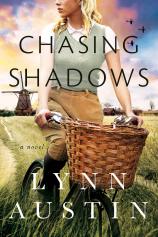Reading Group Guide
Discussion Questions
Chasing Shadows

1. The three main characters in CHASING SHADOWS --- Lena, Miriam and Ans --- are all in different seasons of life and have different outlooks on the world. Which character did you most closely identify with? Which one was the hardest for you to relate to? How did each woman grow and change as a result of her experiences during the war?
2. In the prologue, we read that Lena “used to believe that the enemy of faith was doubt.” But by the end of the war, “she’d learned that faith’s destroyer was fear.” Do you agree with this conclusion? Read Hebrews 11. Did these heroes of faith battle doubt or fear or both?
3. A recurring theme in Miriam’s story is the power of music. Do you have a similar appreciation for music? What form does it take in your life --- playing an instrument, singing, listening to favorite artists or genres? Why do you think music can be such a powerful force? How does it help Miriam, both physically and emotionally?
4. Ans tells Erik that she answers to a higher authority than the Nazis. If God asks her to disobey the authorities (what’s known as civil disobedience), she says she has to obey God, even at the risk of her own life. How do you feel about civil disobedience? What are some other examples from history that come to mind? Are there any moral issues you feel strongly enough about to risk disobeying the law?
5. In one of Erik and Ans’ conversations about right and wrong, Erik asks, “What can you and I do to stop evil when it’s all over the world?” Have you ever felt overwhelmed by the evil in the world? How have you found ways to make a difference? What advice would you give a friend who has the same outlook as Erik?
6. Miriam’s father tells her and Avi that his best university students were the ones who asked questions and says, “I think God likes it when we ask questions.” Do you agree? Can you think of examples from the Bible that point to this being true? How might this idea of questioning God change your prayer life?
7. After Pieter escapes death from a Nazi firing squad, he tells Lena, “I felt at peace as I knelt there. I thought of that Scripture that says, ‘For to me, to live is Christ and to die is gain.’ I understood it.” The Scripture he quotes is Philippians 1:21, written by the apostle Paul. What do you know about Paul’s life that might have led him to make this declaration? How does it apply to Pieter’s life? Is this an assertion that you feel able to make? Why or why not?
8. Ans and her grandfather discuss whether it’s okay to lie for a good cause. He brings up the example of the Jewish midwives lying to Pharaoh in order to save Jewish babies and says, “There’s a difference between lying to save yourself and for your selfish ends --- to get yourself out of trouble or make yourself look good --- and lying to save another person’s life. A huge difference.” Can you think of other examples from the Bible where someone lied for a “good” reason? How do you feel about passages like these?
9. Eloise speaks words that inspire Ans and which Eloise goes on to live out: “What good is my life if I selfishly keep it to myself and don’t spend it for others?” How does this reflect a biblical worldview? What are some ways you have been challenged to spend your life for others? What do you find difficult about doing this?
10. CHASING SHADOWS deals a lot with impossible choices --- trying to decide between two or more options, none of which are really good or right. Miriam and Avi are faced with the impossible choice of whether to separate and entrust their precious baby to strangers, just in hopes of surviving. Have you ever needed to make a decision that had no right answer? Do you think you would make the same choice they made?
11. Lena’s pastor-father tells his congregation, “Jesus said the most important commandments are to love the Lord your God and love your neighbor. And so, whenever we face a dilemma, we can ask, What is the best way to show our love for God and for our neighbor?” How do various characters in the book choose to show their love for God and neighbor?
12. After Pieter is deployed, Lena tells her father she’s “never understood why [God] doesn’t answer our prayers if He loves us.” How does her father respond? When you’ve faced a challenging circumstance and it feels like your pleas are falling on deaf ears, what comforts you?
13. After being invited to join the prison camp orchestra, why does Miriam falter before her first performance? What does Luke 9:23 say about the life of a believer in Christ? Is it too much to ask Miriam to go on with the show?
14. As the war nears its end, Lena has an interesting conversation with her cousin Truus in which Lena tries to share how she’s changed and how her faith has grown. Truus responds, “Can we please talk about something else?” Do you like to share and analyze like Lena, or would you rather put the past behind you and focus on the future like Truus? Is one way better than the other?
15. When we go through a major event --- whether it’s a personal battle like an illness or the loss of a loved one, or something more widespread like a world war --- does it make sense that we would come out the other side changed? In what ways have you experienced change after big upheavals?
Chasing Shadows
- Publication Date: June 8, 2021
- Genres: Christian, Christian Fiction, Fiction, Historical Fiction
- Paperback: 432 pages
- Publisher: Tyndale House Publishers, Inc.
- ISBN-10: 1496437357
- ISBN-13: 9781496437358







